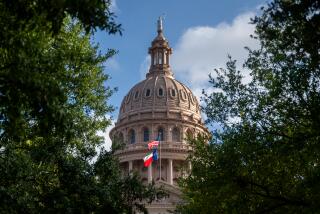Baker to Tell Iraqis of New Allied Power : Diplomacy: He hopes the dramatic evidence will ‘get message home’ in talks in Geneva this week.
- Share via
LONDON — With the U.N. deadline for Iraq to withdraw from Kuwait just over a week away, Secretary of State James A. Baker III hinted Sunday that he will give Iraqi Foreign Minister Tarik Aziz dramatic new evidence of allied military prowess when they meet Wednesday in Geneva.
“We think that this will get the job done, in terms of getting the message home,” Baker said, although he declined to spell out how he could strengthen the often-repeated warning to Iraq to get out of Kuwait or face military force.
At the same time, Baker revealed that he had urged the Soviet Union, once Baghdad’s arms supplier and superpower patron, to send a new message to Iraq, reiterating its condemnation of the occupation of Kuwait. The purpose would be to reinforce Baker’s warning to Aziz.
Baker spoke to reporters aboard his Air Force jetliner on the flight from Washington to London, where he holds preliminary meetings today with Secretary General Manfred Woerner of the North Atlantic Treaty Organization and the foreign ministers of Britain, Italy, Luxembourg and Spain.
The secretary of state said there is absolutely no possibility that he will visit Baghdad before the Jan. 15 deadline, but he left open the possibility that he might agree to meet Iraqi President Saddam Hussein in some neutral country if Aziz demonstrates that such talks would make a peaceful settlement more likely.
He made it clear that the meeting, if it takes place, must come soon after the Geneva talks because Washington is determined not to drag out the final flurry of diplomatic activity.
“The only chance for peace is to make it clear to them that this deadline is real and we are not going to engage in a series of successive discussions, meetings, postponements and that sort of thing,” he said.
“That is the surest formula for avoiding a peaceful solution,” he said.
Nevertheless, Baker said that President Bush and top allied leaders have not yet made the final decision on when or even whether to go to war if Hussein continues to refuse to pull out of Kuwait.
Baker’s schedule devotes most of Wednesday to the meeting with Aziz. But all of his other planned meetings on an eight-day swing through 10 countries are intended to shore up the international coalition against Iraq.
Asked if other countries would follow the U.S. lead if Bush orders the use of force, Baker said: “The vast majority are firm. Most of them are not only prepared to fight but eager to fight.”
Nevertheless, from the U.S. viewpoint, there are some troubling straws in the wind. For instance, French President Francois Mitterrand suggested last week that the U.N. Security Council should meet to determine the next step if Iraq fails to comply with the Jan. 15 deadline. U.N. Secretary General Javier Perez de Cuellar made a similar suggestion.
Both the United States and France--along with Britain, the Soviet Union and China--are permanent council members and are empowered to veto council actions.
Baker said the resolution adopted by the council in November authorizes the use of force, and “it is hard to see what any future Security Council resolution could accomplish.”
Baker confers with Mitterrand on Tuesday in Paris. Other stops include Germany, Turkey, Saudi Arabia, the United Arab Emirates, Egypt, Syria and Canada.
More to Read
Get the L.A. Times Politics newsletter
Deeply reported insights into legislation, politics and policy from Sacramento, Washington and beyond. In your inbox twice per week.
You may occasionally receive promotional content from the Los Angeles Times.









